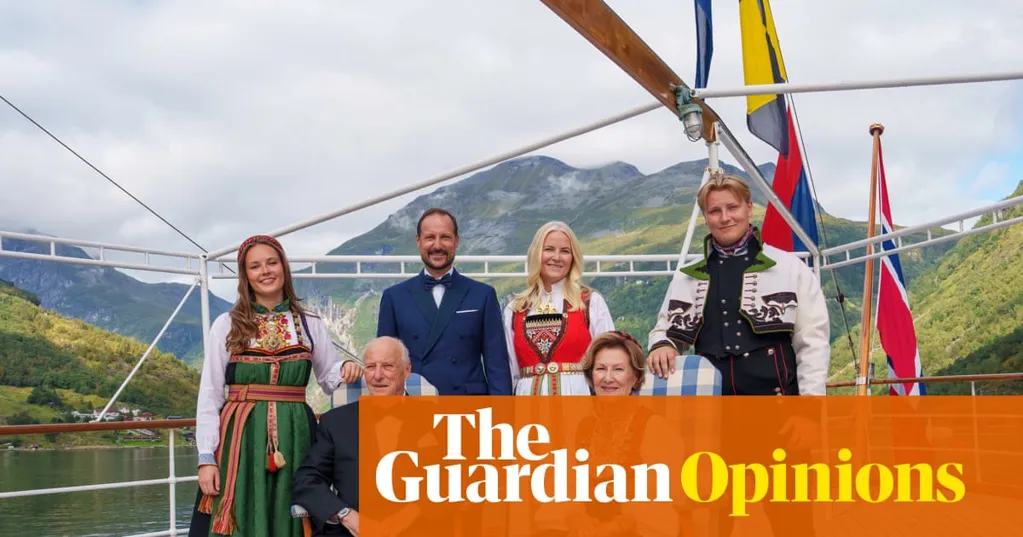Their son-in-law said they were 'ignorant of racism', but immigrant families like mine know how baseless that charge is.
When Netflix released the documentary Rebel Royals: An Unlikely Love Story last week, the world got another glimpse of the unconventional romance between Princess Märtha Louise of Norway and her American husband, Durek Verrett - a self-styled shaman and spiritual healer to Hollywood celebrities. The pairing has been controversial in Norway: Märtha Louise stepped down from her official duties before marrying Verrett; the couple have a history of promoting pseudoscientific beliefs; and Verrett - who is black - has long been the target of racist abuse. It is on this last point that Verrett used the programme to deliver a stinging critique of his in-laws, King Harald and Queen Sonja.
"Most people who are white are trained to listen to white people and not to people of colour," he says in the film. "Her father, her mom, her brother ... they didn't even know what racism was. They would look at me like I was crazy when I would say there's racism."
It makes for dramatic television. But the portrayal of the king and queen as naive, out of touch and even prejudiced is not just misleading; it distorts what they represent in Norway. In fact, for families like mine, the royal couple became a rare unifying force in a society still learning what diversity meant.
International viewers might see this as an echo of Britain's Windsors—glamorous, scandal-ridden, polarising figures who dominate headlines—whereas the Norwegian royals may come across as quieter, less visible, and largely uncontroversial. In reality, Harald and Sonja have been moral anchors in a country that only began receiving significant immigration from Asia and Africa in the 1970s. They wield no political power, yet their authority carries weight. For many Norwegians with immigrant backgrounds—myself included—the royal couple have been among the few who have consistently spoken of us as belonging.
That is why Verrett's accusations have provoked fury and widespread rebuttals. This groundswell of support was not engineered by the palace: citizens spontaneously rallied behind their king and queen.
Some of the loudest voices have come from minority communities. On a prime-time debate show days after the Netflix documentary premiered, queer activists and representatives from religious groups, disabled communities, anti-racist networks and women's organisations lined up to testify to the couple's inclusivity.
The examples are not hard to find. In 2016 the king declared: "Norwegians have come from Afghanistan, Pakistan and Poland, Sweden, Somalia and Syria." For tens of thousands of us, that single line cut through the online hate telling us we would never be "real Norwegians". Inclusion and diversity have not been symbolic gestures, but the king's life's work. In his New Year's Eve speech in 2007 the king addressed racism directly: "We are constantly reminded that humanity and mutual respect cannot be taken for granted. Xenophobia, everyday racism and violence are part of the news picture. Tolerance can be enshrined in law - but prejudice against those who think differently has its roots in the human mind. It is there that the battle must be won."
Sonja, who was not born a royal and fought for nine years to be allowed to marry Harald, has channelled her own experience of exclusion into decades of advocacy for women and minorities. In a small, homogeneous country, these gestures have mattered.
None of this means Norway is free of racism. Its recent politics underscores the tension: in the last election, an anti-immigration party made surprising gains, indicating how fragile social cohesion feels in a time of heightened polarisation. Verrett's personal experiences of prejudice deserve acknowledgment. But to brand the monarchs as ignorant or racist does more harm than good. If every criticism is recast as racism, the term itself is emptied of power—leaving those most affected less protected.
Verrett's own controversies also matter. In Norway, he has been criticised less for his skin colour than for his actions: selling amulets he claimed could protect against Covid, or suggesting childhood cancer is caused by unhappiness. His self-promotion jars with Nordic norms of modesty. Conflating cultural disapproval with racial bias only deepens mistrust.
The lesson is larger than Norway. Public figures invoking racism carry responsibility: their words can clarify, but they can also obscure. If we want the fight against discrimination to succeed, we must name real prejudice when we see it—and also recognise genuine allies, even when imperfect.
For all their privilege, King Harald and Queen Sonja have opened doors, literally and figuratively, to those once shut out. They deserve better than caricature. And Norway—like every democracy—deserves a conversation about race that confronts hard truths without collapsing into distortion.
